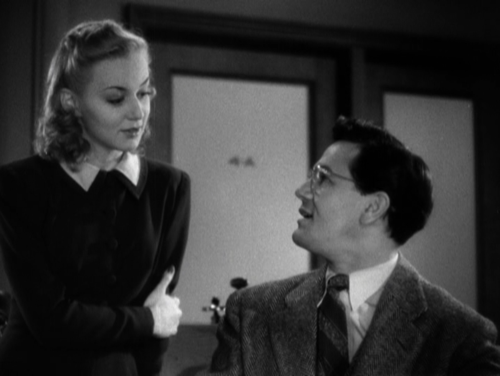SATURDAY’S CHILDREN
(director: Vincent Sherman; screenwriters: based on the Pulitzer Prize play by Maxwell Anderson/Jules and Philip Epstein; cinematographer: James Wong Howe; editor: Owen Marks; music: Adolph Deutsch; cast: John Garfield (Rims Rosson), Anne Shirley (Bobby Halevy), Claude Rains (Henry Halevy), Roscoe Karns (Willie Sands), Florrie Sands (Lee Patrick), Dennie Moore (Gertrude Mills), George Tobias (Herbie Smith), Elizabeth Risdon (Myrtle Halevy), Berton Churchill (Mr. Norman); Runtime: 101; MPAA Rating: NR; producer: Henry Blanke; Warner Brothers; 1940-B/W)
“It’s a rom/com set in a Manhattan when it really seemed like an overwhelming Manhattan.”
Reviewed by Dennis Schwartz
A turgid, dated and middle-brow play rehashed from a 1929 silent and the 1935 drama Maybe It’s Love. It’s a safe look at the striving working-class by Vincent Sherman (“The Garment Jungle “/”The Return of Doctor X “), as the brother writers Jules and Philip Epstein do the screenplay. It’s based on the 1927 Pulitzer Prize play by Maxwell Anderson, that starred Bogie. The rom/com is set in a Manhattan when it really seemed like an overwhelming Manhattan, with double-decker buses and a hustle-bustle on 5th Avenue.
The career bookkeeper Henry Halevy (Claude Rains, steals the film) and his wife (Elisabeth Risdon) live in Manhattan with their two daughters, the single 22-year- old Bobby (Anne Shirley) and her 25-year-old married sister Florrie (Lee Patrick) and her husband Willie Sands (Roscoe Karns), a worker at a collection agency.
The main story follows a struggling young couple, the 25-year-old Rims Rosson (John Garfield), an impractical inventor, a dreamer with get-rich schemes, and the marriage-minded nice girl Bobby Halevy (Anne Shirley), who falls for Rims when her cynical dad, Henry (Claude Rains) gets her an office job in the same place he’s employed at.
Afraid she’s going to lose Rims, who just accepted a job in the Philippines that promises to use his invention of turning hemp into silk dresses, Bobby follows her scheming sister Florrie’s advice and lies to her man to snag him. He thereby turns down the job offer to still work for Martin’s (a mail order shipping company) and be with her so she doesn’t marry another.
The young couple marry but struggle trying to earn enough to survive during the Depression, which results in a glum tale.
It shines mostly because of Rains’ sharp-tongued self-sacrificing father, that Garfield proves he can act with passion as the all-American suitor and that Anne Shirley makes for a pleasing working-class ideal wife. It should please those who love those so-called ‘wonderful’ old Hollywood films that tell real-life stories.

REVIEWED ON 3/2/2021 GRADE: C+